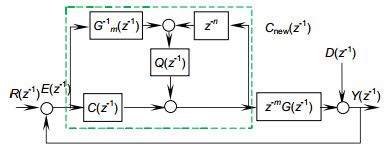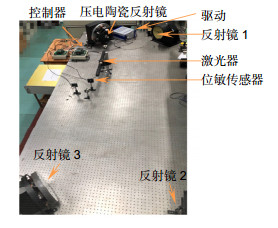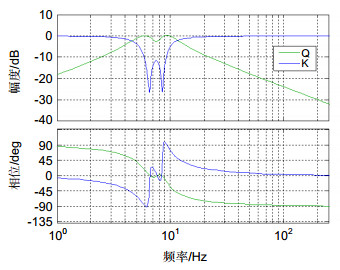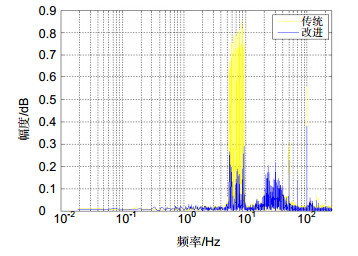-
摘要
在微弧度级的大型望远镜中,抑制振动已经成为一项非常关键的技术。在微弧度级的大型望远镜中,抑制振动已经成为一项非常关键的技术。经典的反馈控制方法由于图像传感器本身具有采样频率低、积分时间长的特点使得控制回路的带宽受限的原因不能很好地抑制回路中的扰动,尤其是存在范围广、能量较大的宽带扰动。本文基于优化的力设计理念提出一种扰动抑制的Youla控制器优化设计方法来提高系统的宽带扰动抑制能力。在可以获取到宽带扰动频率的情况下,该方法通过设计合适的Q滤波器去适应宽带扰动,从而达到抑制扰动的目的。仿真及实验结果表明,相对于传统的比例-积分控制方法,该方法极大地提高了系统的宽带扰动抑制能力,增强了系统的闭环性能。此外,由于此方法模型依赖程度低、易于实现,故可以推广到许多工程实际中。

Abstract
Vibration rejection is a key technology of telescopes with stable accuracy of μrad level. Due to the low-rate sample and large time delay of the image sensor, the conventional control loop cannot well mitigate vibrations, especially the wideband vibrations with wide range and large energy. On the concept of optimal force design, an improved wideband vibration rejection method based on Youla parameterization is proposed to mitigate vibrations for improving the closed-loop performance of telescopes. In the case that the disturbances frequency can be obtained, this method can mitigate wideband vibrations by designing an appropriate Q-filter to accommodate to the wideband vibrations. The simulation and experimental results show that the proposed method greatly improves the wideband vibration rejection ability and closed-loop performance of the system compared with the traditional proportional-integral control method. In addition, this method can be extended to many engineering projects because of its low dependence and easy implementation.
-
Key words:
- telescopes /
- Youla parameterization /
- Q-filter /
- wide-band vibrations rejection
-
Overview

Overview: Vibration rejection is a key technology of telescopes with stable accuracy of μrad level. Because the image sensor has the characteristics of low sampling rate and large delay time, the bandwidth of the control system is limited, and the control system cannot well mitigate vibrations, especially the wideband vibrations with wide range and large energy. Therefore, some new methods of vibration rejections have been developed, such as disturbance feed-forward control, as well as some improved control structures and optimized controls. Although these methods have the advantage of the control loop bandwidth without the limitation of the low sampling rate and large delay time of image sensor, they inevitably have some disadvantages: the closed-loop performance of the system is not only affected by the low-frequency drift and high-frequency noise of the measurement link, but also by the accuracy of the disturbance and the precision of the dynamic model. Therefore, an improved wideband vibration rejection method based on Youla parameterization is proposed to reduce these problems for improving the vibration rejection ability of the system. In the case that the disturbances frequency can be obtained, this method can mitigate wideband vibrations by designing an appropriate Q-filter to accommodate to the wideband vibrations. Considering the stability and closed-loop performance of the system, this paper proposes a novel design method of Q-filter to mitigate wideband vibrations, which is based on that wideband vibrations can be viewed as the multiple narrow-band vibrations with similar central frequencies so that multiple notch filters can be designed to act simultaneously to mitigate wideband vibrations. In this paper, we focus on introduction of the improved wideband vibration rejection method and its stability, and the design of the Q-filter. What's more, experiments are carried out to verify the correctness and feasibility of the method. Because this improved EDOB controller has a low dependence on the system model, the vibration rejection ability of the control system won't be restricted by the noise in the loop. The theoretical and experimental results show that this method can effectively mitigate wideband vibrations and improve the vibrations rejection ability of the system. Furthermore, this control method only utilizes an image sensor that only provide position deviation, which is not only economical, but also convenient to implement. Moreover, this method can be used not only in the tip-tilt mirror system but also in other servo control systems because of its simple structure and design process. Next work will concentrate on automatically designing for the parameters of the Q-filter, so we need to do the online identification of disturbances firstly.
-

-
参考文献
[1] Sivo G, Kulcsár C, Conan J M, et al. On-sky validation of an optimal LQG control with vibration mitigation: from the CANARY Multi-Object Adaptive Optics demonstrator to the Gemini Multi-Conjugated Adaptive Optics facility[C]//American Astronomical Society Meeting, 2018.
[2] Petit C, Conan J M, Kulcsár C, et al. First laboratory validation of vibration filtering with LQG control law for adaptive optics[J]. Optics Express, 2008, 16(1): 87–97. http://www.ncbi.nlm.nih.gov/pubmed/18521135
[3] Tang T, Yang T, Qi B, et al. Error-based feedforward control for a charge-coupled device tracking system[J]. IEEE Transactions on Industrial Electronics, 2018, 66(10): 8172–8180. http://www.wanfangdata.com.cn/details/detail.do?_type=perio&id=4945260c143e5d9808692b3c859210d1
[4] Glück M, Pott J U, Sawodny O. Piezo-actuated vibration disturbance mirror for investigating accelerometer-based tip-tilt reconstruction in large telescopes[J]. IFAC-PapersOnLine, 2016, 49(21): 361–366. https://www.sciencedirect.com/science/article/pii/S2405896316321723
[5] Sivo G, Kulcsár C, Conan J M, et al. First on-sky SCAO validation of full LQG control with vibration mitigation on the CANARY pathfinder[J]. Optics Express, 2014, 22(19): 23565–23591. doi: 10.1364/OE.22.023565
[6] Guesalaga A, Neichel B, O'Neal J, et al. Mitigation of vibrations in adaptive optics by minimization of closed-loop residuals[J]. Optics Express, 2013, 21(9): 10676–10696.
[7] 薛正燕.卫星光通信捕获跟踪技术研究[D].成都: 中国科学院光电技术研究所, 2015.
Xue Z Y. Research on acquisition and tracking technologies in satellite optical communication[D]. Chengdu: Institute of Optics and Electronics, Chinese Academy of Sciences, 2015.
[8] Tang T, Qi B, Yang T. Youla-Kucera parameterization-based optimally closed-loop control for tip-tilt compensation[J]. IEEE Sensors Journal, 2018, 18(15): 6154–6160. http://www.wanfangdata.com.cn/details/detail.do?_type=perio&id=41f84da9868e89946c108b464e2bd464
[9] Tang T, Niu S X, Yang T, et al. Vibration rejection of Tip-Tilt mirror using improved repetitive control[J]. Mechanical Systems and Signal Processing, 2019, 116: 432–442. http://www.wanfangdata.com.cn/details/detail.do?_type=perio&id=8b3d7b2f467daff53eceae36954edfe2
[10] Sun L T, Chen X, Tomizuka M. Enhanced wide-spectrum vibration suppression based on adaptive loop shaping[C]//2016 American Control Conference (ACC), 2016.
[11] Sun L T, Jiang T Y, Xu C. Adaptive loop shaping for wideband disturbances attenuation in precision information storage systems[J]. IEEE Transactions on Magnetics, 2017, 53(5): 3301813. http://www.wanfangdata.com.cn/details/detail.do?_type=perio&id=1ae3a28863e21d4fb12434fe60961180
[12] Tang T, Niu S X, Ma J G, et al. A review on control methodologies of disturbance rejections in optical telescope[J]. Opto-Electronic Advances, 2019, 2(10): 190011. http://www.wanfangdata.com.cn/details/detail.do?_type=perio&id=gdjz-e201910002
-
访问统计


 E-mail Alert
E-mail Alert RSS
RSS

 下载:
下载:








